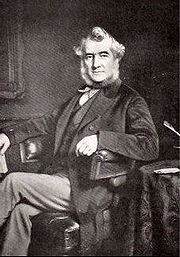
James Joseph Allport
Encyclopedia

Birmingham
Birmingham is a city and metropolitan borough in the West Midlands of England. It is the most populous British city outside the capital London, with a population of 1,036,900 , and lies at the heart of the West Midlands conurbation, the second most populous urban area in the United Kingdom with a...
and was associated with railways from an early period of his life.
In 1843 joined the Birmingham and Derby Junction Railway
Birmingham and Derby Junction Railway
The Birmingham and Derby Junction Railway was a British railway company. From Birmingham it connected at Derby with the North Midland Railway and the Midland Counties Railway at what became known as the Tri Junct Station...
in 1839 as the traffic agent at Hampton in Arden, becoming Chief Clerk, then General Manager. When it merged into the Midland Railway
Midland Railway
The Midland Railway was a railway company in the United Kingdom from 1844 to 1922, when it became part of the London, Midland and Scottish Railway....
, he moved to George Hudson
George Hudson
George Hudson , English railway financier, known as "The Railway King", was born, the fifth son of a farmer, in Howsham, in the parish of Scrayingham in the East Riding of Yorkshire, north of Stamford Bridge, east of York. He is buried in Scrayingham...
's York, Newcastle and Berwick Railway until it merged into the North Eastern Railway
North Eastern Railway (UK)
The North Eastern Railway , was an English railway company. It was incorporated in 1854, when four existing companies were combined, and was absorbed into the London and North Eastern Railway at the Grouping in 1923...
.
Six years later he assumed the charge of the Manchester, Sheffield and Lincolnshire Railway
Manchester, Sheffield and Lincolnshire Railway
The Manchester, Sheffield and Lincolnshire Railway was formed by amalgamation in 1847. The MS&LR changed its name to the Great Central Railway in 1897 in anticipation of the opening in 1899 of its London Extension.-Origin:...
(now the Great Central) railway, and finally, in 1853, was appointed to the general managership of the Midland Railway; an office which he held continuously, with the exception of a few years between 1857 and 1860, when he was managing director to Palmer's Shipbuilding Company at Jarrow
Jarrow
Jarrow is a town in Tyne and Wear, England, located on the River Tyne, with a population of 27,526. From the middle of the 19th century until 1935, Jarrow was a centre for shipbuilding, and was the starting point of the Jarrow March against unemployment in 1936.-Foundation:The Angles re-occupied...
, until his retirement in 1880, when he became a director.
During these twenty-seven years the Midland grew to be one of the most important railway systems in England, partly by the absorption of smaller lines and partly by the construction of two main extensions on the south to London
London
London is the capital city of :England and the :United Kingdom, the largest metropolitan area in the United Kingdom, and the largest urban zone in the European Union by most measures. Located on the River Thames, London has been a major settlement for two millennia, its history going back to its...
and on the north to Carlisle whereby it obtained an independent through-route between the metropolis and the north. He was instrumental in the Midland's partnership with the M, S & L, which led to the "Sheffield and Midland Railway Companies' Committee
Sheffield and Midland Railway Companies' Committee
The Sheffield and Midland Railway Companies' Committee was incorporated by Act of Parliament in 1869 as a joint venture between the Midland Railway and the Manchester, Sheffield and Lincolnshire Railway.-Origins:...
", and gave the Midland access to Manchester
Manchester
Manchester is a city and metropolitan borough in Greater Manchester, England. According to the Office for National Statistics, the 2010 mid-year population estimate for Manchester was 498,800. Manchester lies within one of the UK's largest metropolitan areas, the metropolitan county of Greater...
for its London trains.
In the railway world Allport was known as a keen tactician and a vigorous fighter, and he should be remembered as the pioneer of cheap and comfortable railway travelling. He was the first to appreciate the importance of the third-class passenger as a source of revenue, and accordingly, in 1872, he inaugurated the policy, subsequently adopted more or less completely by all the railways of Great Britain
Great Britain
Great Britain or Britain is an island situated to the northwest of Continental Europe. It is the ninth largest island in the world, and the largest European island, as well as the largest of the British Isles...
, of carrying third-class passengers in well-fitted carriages (at the uniform rate of one penny a mile on all trains decreed by Parliament). The diminution in the receipts from second-class passengers, which was one of the results, was regarded by some authorities as a sign of the unwisdom of his action, but to him it appeared a sufficient reason for the abolition of second-class carriages, which therefore disappeared from the Midland system in 1875, the first-class fares being at the same time substantially reduced.
He was a director of the Midland from 1854 to 1857, but returned to being the general manager. When he retired in 1880 he was given an honorary directorship, and was knighted in 1884.

